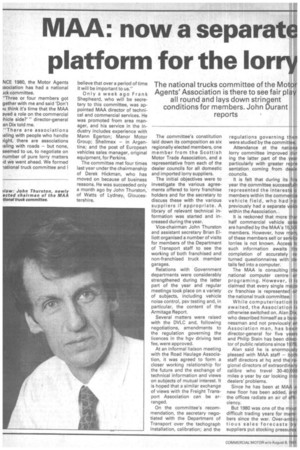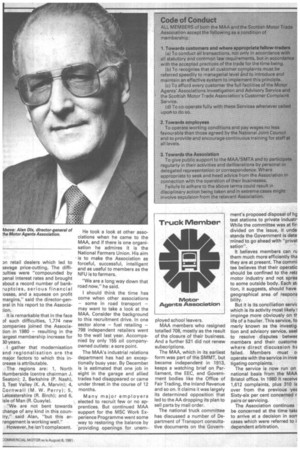MAA. now a separatO platform for the lorry
Page 28

Page 29

If you've noticed an error in this article please click here to report it so we can fix it.
The national trucks committee of the Motor Agents' Association is there to see fair play all round and lays down stringent conditions for members. John Durant reports
NCE 1980, the Motor Agents ;sociation has had a national Ack committee.
"Three or four members got gether with me and said "Don't iu think it's time that the MAA ayed a role on the commercial .hide side?' " director-general an Dix told me.
"There are associations !aling with people who handle )ight, there are associations !aling with roads — but none, seemed to us, to negotiate on number of pure lorry matters id we went ahead. We formed iational truck committee and I believe that over a period of time it will be important to us."
Only a week ago Frank Shepheard, who will be secretary to this committee, was appointed MAA director of technical and commercial services. He was promoted from area manager, and his service in the industry includes experience with Mann Egerton; Manor Motor Group; Shellmex — in Argentina; and the post of European vehicles sales manager, original equipment, for Perkins.
The committee met four times last year under the chairmanship of Derek Hickman, who has moved on because of business reasons. He was succeeded only a month ago by John Thurston,' of Watts of Lydney, Gloucestershire. The committee's constitution laid down its composition as six regionally elected members, one member from the Scottish Motor Trade Association, and a representative from each of the dealer councils for all domestic and imported lorry suppliers.
The initial objectives were to investigate the various agreements offered to lorry franchise holders and for the secretary to discuss these with the various suppliers if appropriate. A library of relevant technical information was started and increased during the year.
Vice-chairman John Thurston and assistant secretary Brian Elliott organised a number of visits for members of the Department of Transport staff to see the working of both franchised and non-franchised truck member garages.
Relations with Government departments were considerably strengthened during the latter part of the year and regular meetings took place on a variety of subjects, including vehicle noise control, psv testing and, in particular, the content of the Armitage Report.
Several matters were raised with the DVLC and, following negotiations, amendments to the regulation governing the licences in the hgv driving test fee, were approved.
At an informal liaison meeting with the Road Haulage Association, it was agreed to form a closer working relationship for the future and the exchange of technical information and views on subjects of mutual interest. It is hoped that a similar exchange of views with the Freight Transport Association can be arranged.
On the committee's recommendation, the secretary negotiated with the Department of Transport over the tachograph installation, calibration; and the regulations governing then were studied by the committee.
Attendance at the nationa lorry committee improved dur ing the latter part of the year particularly with greater repre sentation coming from deale councils.
It is felt that during its firs year the committee successfulh represented the interests o members within the commercia vehicle field, who had no previously had a separate voicE within the Association.
It is reckoned that more thar half commercial vehicle sale: are handled by the MAA's 15,50( members. However, how mem of these members sell or servicE lorries is not known. Access tc such information awaits thE completion of accurately re turned questionnaires with de tails fed into a computer.
The MAA is consulting thE national computer centre or programing. However, it i E claimed that every single majoi cv franchise is represented or the national truck committee.
While computerisation i awaited, the Association i otherwise switched on. Alan Dix, who described himself as a businessman and not previously an Association man, has been director-general for five years and Philip Stein has been director of public relations since 1979.
Alan said he is enormously pleased with MAA staff — both staff directors at hq and the regional directors of extraordinary calibre who travel 30-40,000 miles a year by car looking into dealers'. problems.
Since he has been at MAA a new floor has been added, and the offices radiate an air of efficiency.
But 1980 was one of the most difficult trading years for members since the war. Over-ambitious sales forecasts by suppliers put stocking pressures n retail dealers which led to aavage price-cutting. The difficulties were "compounded by penal interest rates and brought about a record number of bankru ptcies, serious financial losses, and a squeeze on profit margins," said the director-genaral in his report to the Association.
It is remarkable that in the face af such difficulties, 1,774 new companies joined the Association in 1980 resulting in the largest membership increase for 30 years.
I gather that modernisation and regionalisation are the major factors to which this increase is attributable.
The regions are: 1, North Humberside (centre chairman J. Seaton); 2, Berkshire (P. Nash), 3, Test Valley {K. A. Marvin); 4r Cornwall (M. W. Perry); 5, Leicestershire (R. Birch); and 6, Isle of Man (R. Quayle).
"We are not bent towards change of any kind in this country," said Alan, "but this arrangement is working well."
However, he isn't complacent. He took a look at other associations when he came to the MAA, and if there is one organisation he admires it is the National Farmers Union. His aim is to make the Association as forceful, successful, intelligent and as useful to members as the NFU is to farmers.
"We are a long way down that road now," he said.
I should think the time has come when other associations some in road transport may want to take a look at the MAA. Consider the background to this recruitment drive. In one sector alone fuel retailing 798 independent retailers went to the wall last year. Accompanied by only 155 oil companyowned outlets: a sore point.
The MAA's industrial relations department has had an exceptionally busy year. By December is is estimated that one job in eight in the garage and allied trades had disappeared or came under threat in the course of 12 months.
Many major employers elected to recruit few or no apprentices. But continued MAA support for the MSC Work Experience Programme went some ,way to restoring the balance by providing openings for unem
played school leavers.
MAA members who resigned totalled 708, mostly as the result of the closure of their business. And a further 521 did not renew subscriptions.
The MAA, which in its earliest form was part of the SMMT, but became independent in 1913, keeps a watching brief on Parliament, the EEC, and Government bodies like the Office of Fair Trading, the Inland Revenue and so on. It claims it was largely its determined opposition that led to the AA dropping its plan to sell parts by mail order.
The national truck committee has discussed a number of Department of Transport consultative documents on the Govern
ment's proposed disposal of hg test stations to private industr While the committee was at fin divided on the issue, it unde stands the Government is dete mined to go ahead with "privet sation".
It believes members can ru them much more efficiently tha they are at present. The commi tee believes that their operatic should be confined to the reta motor industry and not spree to some outside body. Each sti tion, it suggests, should have geographical area of respons bility.
But it is its conciliation servic which is its activity most likely impinge more obviously on th life of a haulier. This service, fo merly known as the investig. tion and advisory service, seel to resolve disputes betweE members and their custome where direct discussion hE failed. Members must ci operate with the service in inve tigating complaints.
The service is now run on national basis from the MAA Bristol office. In 1980 it receivE 1,612 complaints, plus 310 1£ over from the previous yea Sixty-six per cent concerned r pairs or servicing.
The Association continues be concerned at the time takE to arrive at a decision in sorr cases which were referred to i dependent arbitration.














































